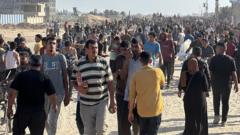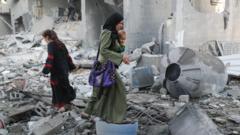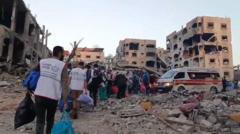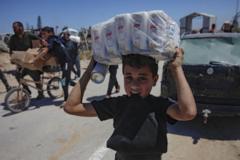In an intense interview, the UN humanitarian chief raises alarms about the dire food scarcity and ongoing military actions affecting thousands in Gaza as the international community grapples with the crisis.
UN Official Warns of Forced Starvation in Gaza Amid Easing Blockade
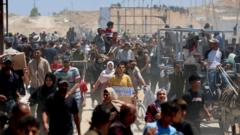
UN Official Warns of Forced Starvation in Gaza Amid Easing Blockade
Tom Fletcher labels the humanitarian crisis in Gaza as potentially a war crime, urging global intervention.
Israel has faced growing international condemnation regarding its military offensive in Gaza, with the UN's humanitarian chief, Tom Fletcher, describing the situation as one of forced starvation. In a candid interview with BBC, Fletcher outlined his views on the humanitarian crisis, asserting that the conditions in Gaza represent a significant change in global perception and response.
He remarked that the definition of forced starvation aligns with the classification of a war crime. When pressed on whether this could be seen as such, Fletcher didn't hesitate to affirm that "it is classified as a war crime," emphasizing the importance of accountability in these scenarios.
Fletcher expressed remorse for a previous assessment concerning the imminent death of 14,000 infants due to a lack of aid in Gaza, a claim later retracted by the UN. "We have to be precise with language," he acknowledged while explaining the highly sensitive context in which humanitarian organizations operate.
Following an almost three-month blockade, Israel has recently allowed limited aid into Gaza. However, the resumption of military strikes against Hamas has left civilians in urgent need of assistance. Since the easing of restrictions, chaotic scenes unfolded at distribution centers managed by the Gaza Humanitarian Foundation, resulting in numerous injuries amidst overwhelming crowds seeking food and supplies.
Fletcher condemned the ongoing Israeli policy of barricading aid despite clear humanitarian need, highlighting how such measures are designed to "put pressure on the population of Gaza." He specifically called on Israeli leadership to publicly reject perilous statements made by officials that could lead to forced displacement and exacerbate the crisis.
The situation has ignited international outcry, with leaders from various countries urging Israel to halt military operations and allow for the unhindered flow of humanitarian aid. European Union officials, including Kaja Kallas, have criticized the excessive nature of Israeli military responses. Calls for urgent intervention have emerged from high-profile figures across Europe and North America.
In response to allegations directed at him for his outspoken comments, Fletcher defended his stance, asserting that his advocacy for aid was driven by a genuine concern for the humanitarian crisis at hand. He emphasized the need for precision in communication while stressing his commitment to continue advocating for the lives of those suffering in Gaza.
The ongoing conflict, exacerbated by recent developments, leaves many questioning the overall objectives behind Israel’s military strategy. Fletcher suggested that the current aim might extend beyond hostage recovery, damaging the prospects for peace within the region.
He also refuted assertions that Hamas is hoarding food supplies intended for civilians, stating that it is crucial for humanitarian aid to reach those in need, free from contamination by militant groups.
Amid growing global crises and an increasingly polarized international landscape, Fletcher recognized the broader implications of failure to address humanitarian emergencies adequately, stating, "We deal with the consequences."
He remarked that the definition of forced starvation aligns with the classification of a war crime. When pressed on whether this could be seen as such, Fletcher didn't hesitate to affirm that "it is classified as a war crime," emphasizing the importance of accountability in these scenarios.
Fletcher expressed remorse for a previous assessment concerning the imminent death of 14,000 infants due to a lack of aid in Gaza, a claim later retracted by the UN. "We have to be precise with language," he acknowledged while explaining the highly sensitive context in which humanitarian organizations operate.
Following an almost three-month blockade, Israel has recently allowed limited aid into Gaza. However, the resumption of military strikes against Hamas has left civilians in urgent need of assistance. Since the easing of restrictions, chaotic scenes unfolded at distribution centers managed by the Gaza Humanitarian Foundation, resulting in numerous injuries amidst overwhelming crowds seeking food and supplies.
Fletcher condemned the ongoing Israeli policy of barricading aid despite clear humanitarian need, highlighting how such measures are designed to "put pressure on the population of Gaza." He specifically called on Israeli leadership to publicly reject perilous statements made by officials that could lead to forced displacement and exacerbate the crisis.
The situation has ignited international outcry, with leaders from various countries urging Israel to halt military operations and allow for the unhindered flow of humanitarian aid. European Union officials, including Kaja Kallas, have criticized the excessive nature of Israeli military responses. Calls for urgent intervention have emerged from high-profile figures across Europe and North America.
In response to allegations directed at him for his outspoken comments, Fletcher defended his stance, asserting that his advocacy for aid was driven by a genuine concern for the humanitarian crisis at hand. He emphasized the need for precision in communication while stressing his commitment to continue advocating for the lives of those suffering in Gaza.
The ongoing conflict, exacerbated by recent developments, leaves many questioning the overall objectives behind Israel’s military strategy. Fletcher suggested that the current aim might extend beyond hostage recovery, damaging the prospects for peace within the region.
He also refuted assertions that Hamas is hoarding food supplies intended for civilians, stating that it is crucial for humanitarian aid to reach those in need, free from contamination by militant groups.
Amid growing global crises and an increasingly polarized international landscape, Fletcher recognized the broader implications of failure to address humanitarian emergencies adequately, stating, "We deal with the consequences."


